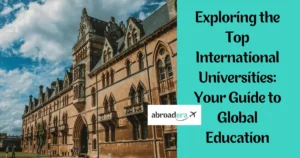Canada remains a top destination for international students seeking high-quality education, diverse career opportunities, and a welcoming multicultural environment. If you’re planning to study in Canada Universities in 2025, the September intake is the most popular and widely available option.
Is the September Intake Right for You?
The September intake (Fall intake) is the primary admission period in Canada Universities, offering students maximum flexibility and opportunities. But is it the right choice for you? Let’s explore:
Advantages of the September Intake
- Widest Course Availability – Most universities open all programs, including competitive and high-demand courses.
- Better Scholarship Opportunities – Many institutions offer financial aid and merit-based scholarships.
- Stronger Job & Internship Prospects – The academic cycle aligns with Canada’s job market, improving access to internships, part-time work, and co-op programs.
- Ideal for International Students – More orientation programs, student support services, and housing options make settling in easier.
- Favourable Weather Conditions – Arriving in Canada before winter helps students adjust better.
Who Should Apply for the September Intake?
- Students looking for the widest choice of universities and programs.
- Applicants seeking scholarships and funding opportunities.
- Those who want to align their studies with the job market for better internship opportunities.
- Students who need extra time to prepare for language tests (IELTS/TOEFL), finances, or documentation.
If the September 2025 intake for Canada Universities aligns with your goals, start preparing early to secure your place!
List of Canadian Institutions Open for September 2025 Intake

Below is a province-wise list of universities and colleges currently accepting applications. Institutions with application fee waivers are highlighted.
Ontario
- Lakehead University – Thunder Bay
- University of Windsor – Windsor (Application fee waiver for UG programs)
- Niagara University – Vaughan
- Conestoga College – Kitchener
- Humber Polytechnic – Toronto (Application fee waiver)
- Seneca Polytechnic – Toronto (Application fee waiver)
- Fanshawe College – London (No application fee)
- Durham College – Oshawa (Application fee waiver)
- Sheridan College – Oakville (Application fee waiver)
- George Brown College – Toronto (Application fee waiver)
- Fleming College – Peterborough (Application fee waiver)
- Georgian College – Barrie (Application fee waiver)
- Lambton College – Sarnia and Ottawa (No application fee)
- Wilfrid Laurier University (via Wilfrid Laurier International College) – Brantford (Application fee waiver)
- Toronto Metropolitan University (via Toronto Metropolitan International College) – Toronto (Application fee waiver)
British Columbia
- New York Institute of Technology – Vancouver
- Thompson Rivers University – Kamloops (Application fee waiver)
- Capilano University – North Vancouver
- University of Northern British Columbia – Prince George
- Kwantlen Polytechnic University – Surrey (Application fee waiver)
- Fairleigh Dickinson University – Vancouver
- Vancouver Community College – Vancouver
- Simon Fraser University (via Fraser International College) – Burnaby (Application fee waiver)
Saskatchewan
- University of Regina – Regina
Alberta
- Southern Alberta Institute of Technology (SAIT) – Calgary (Application fee waiver)
- Bow Valley College – Calgary
- NorQuest College – Edmonton
- University of Lethbridge (via ULethbridge International College Calgary) – Calgary (Application fee waiver)
Nova Scotia
- Acadia University – Wolfville
- Cape Breton University – Sydney
Manitoba
- University of Manitoba (via International College of Manitoba) – Winnipeg (Application fee waiver)
📑 Documents Required for Canada Universities: September 2025 Intake

Before you apply, make sure you have all the necessary documents ready:
1. Academic Documents
✔️ Transcripts & Certificates – 10th, 12th, and Bachelor’s/Master’s degree (if applicable).
✔️ Official Mark Sheets – Semester-wise or consolidated.
2. English Language Proficiency Test Scores
✔️ IELTS/TOEFL/PTE/Duolingo – Must meet the university’s minimum requirements.
3. Statement of Purpose (SOP)
✔️ A well-written SOP explaining your academic background, career goals, and reasons for choosing the university/course.
4. Letters of Recommendation (LORs)
✔️ Typically two or three LORs from professors or employers.
5. Resume/CV
✔️ Required for Master’s and professional courses. Should include education, work experience, and skills.
6. Passport Copy
✔️ A valid passport (must be valid for at least the duration of your study program).
7. Proof of Funds
✔️ Bank statements, sponsorship letters, or GIC (Guaranteed Investment Certificate) showing you can fund tuition and living expenses.
8. Study Permit (Student Visa)
✔️ Once you receive the Letter of Acceptance (LOA) from a university, apply for a Canadian Study Permit.
Key Deadlines for September 2025 Intake
🗓 January 2025 – February 2025: Research Canada universities, shortlist programs, and begin preparing applications.
🗓 February – March 2025: Submit applications before priority deadlines to increase chances for admission and scholarships.
🗓 April – May 2025: Receive admission offers and confirm your acceptance in Canada universities.
🗓 June – July 2025: Apply for a student visa and arrange accommodation.
🗓 August – September 2025: Prepare for travel, orientation, and the start of your academic journey in Canada.
Common Mistakes to Avoid When Applying for the September 2025 Intake
Many students make avoidable mistakes during their application process in Canada Universities. Here’s what you should watch out for:
1. Applying Too Late
✔ Mistake: Waiting until the last minute to apply, leading to missed deadlines and fewer course options.
✔ Solution: Apply as early as possible, ideally between January – March 2025 for the best chances.
2. Ignoring Application Fee Waivers
✔ Mistake: Paying unnecessary application fees when some universities offer fee waivers.
✔ Solution: Always check the official university website or confirm with an admissions counselor.
3. Weak Statement of Purpose (SOP)
✔ Mistake: Submitting a generic or poorly written SOP that doesn’t explain your motivations clearly.
✔ Solution: Write a strong, personalized SOP that reflects your academic goals, career plans, and reasons for choosing Canada Universities.
4. Overlooking English Test Requirements (IELTS/TOEFL/PTE)
✔ Mistake: Assuming that all universities accept Duolingo or not preparing properly for IELTS/TOEFL.
✔ Solution: Check each university’s specific language requirements and take the test well in advance.
5. Missing Important Documents
✔ Mistake: Forgetting key documents like LORs, academic transcripts, or proof of funds, which can delay your application.
✔ Solution: Prepare a document checklist and ensure everything is in order before submitting applications.
6. Not Checking University-Specific Deadlines
✔ Mistake: Assuming that all universities follow the same deadline.
✔ Solution: Each university has different deadlines. Double-check on the official website before applying.
7. Underestimating the Study Permit Process
✔ Mistake: Applying for a study permit (student visa) too late, leading to visa delays.
✔ Solution: As soon as you get your Letter of Acceptance (LOA), apply for a study permit immediately.
8. Not Arranging Finances in Advance
✔ Mistake: Waiting until the last moment to show proof of funds, which can delay the visa process.
✔ Solution: Ensure you have bank statements, GIC (Guaranteed Investment Certificate), or a sponsorship letter ready.
9. Not Researching Housing and Living Expenses
✔ Mistake: Not planning where to live and underestimating living costs.
✔ Solution: Look for on-campus or off-campus housing options early and plan your budget accordingly.
10. Ignoring Post-Graduation Work Permit (PGWP) Rules
✔ Mistake: Choosing a program that isn’t eligible for PGWP, affecting your chances of working in Canada after graduation.
✔ Solution: Check if your course qualifies for a Post-Graduation Work Permit (PGWP) before applying.
This might be useful for you: 8 Key Steps to Successfully Apply for a Canada Student Visa
Final Tip: Plan & Apply Early!

Avoid these common mistakes, plan ahead, and stay organized to increase your chances of admission. If you need guidance, reach out to study-abroad advisors for expert assistance.
The September 2025 intake is a golden opportunity to study in Canada Universities with a wide range of university choices, scholarships, and job prospects. With institutions offering application fee waivers and a diverse selection of programs, this is the best time to start your study-abroad journey.
Need help with your application? Reach out to us at 9717859050 or https://abroadera.com/contact-us/.







